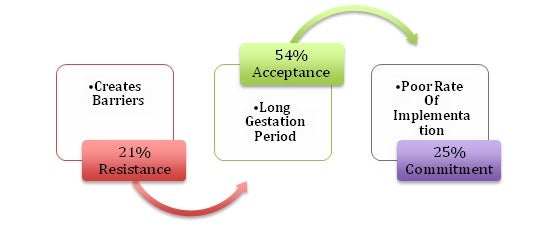10 Ways Organisations can Work On Change Management! 'Change' is a process, and it involves ideas, thoughts, processes and systems that are understood and driven by people within a given framework.
By Pramod Parkar •
Opinions expressed by Entrepreneur contributors are their own.
You're reading Entrepreneur India, an international franchise of Entrepreneur Media.

Change has become a buzzword within organisations. The dynamic world of global business is constantly challenged with innovating and modifying systems and processes and to compete and beat the market needs, change becomes a constant endeavour to deal with.
The theory of management states that "Change' is a process, and it involves ideas, thoughts, processes and systems that are understood and driven by people within a given framework. However, most businesses deploy change as projects that aim at creating, innovating processes involving dynamic steps that finally get installed wherein people need to comply with and condition themselves to work their way with changes forward.
A well established fact is that "People do not change unless they believe that they cannot continue to stay where they are', and this means that if an organisation expects people to accept and embrace change then the start needs to have a very strong & compelling reason that ensures people need to believe that "The Purpose Of Change' is communicated in manner that compels people to believe why they cannot stay where they are and how a change is going to take them to the place they all best need to be.
When it comes to systems, an organisation is driven to use the best scope of modelling their IT to meet on demands. When it comes to strategic change, the scope of management process change comes into play. The truth of the matter is that every change involves people being affected! That's the challenge that every organisation is constantly battling.
Project managers and leaders consider the scope of the what and where factors across installing a change, however the people affected need to adapt and alter their behaviours to manage change! Research on change clearly brings extremely dissatisfying statistics on how effectively a change gets implemented!
In 2014, change survey data from 5857 people in global organizations across 40 countries indicated the following distribution of data across the commitment stages in relation to a specific change that their organization was going through…

A typical organisation faces a significant challenge created by the projects it runs, whether they are focused on cost reduction, process redesign, mergers, restructuring, or a large IT implementation. It can be difficult to capture the value of all these activities simultaneously.
However, the biggest difficulty is usually getting employees to embrace the change each project brings. This is the realm of change management – helping people adopt new behaviours, accept and take ownership of change instead of resisting it. The way you implement change is at least as important as the strategy or solution you're trying to implement, if not more so. Successful project implementations rarely come from purely technical project plans that do not take into account the human dynamics?of change.
To manage change successfully, there needs to be a very structured approach at 2 levels. First at the organisational level wherein there is a need to build on a strong "Change Purpose' that compels people, then build change leadership capability and create a powerful people engagement process. The second aspect is to manage the implementation at the ground level, and this demands developing committed local sponsors, build personal commitment and manage sustained performance. Change happens best when people are compelled and engaged!
Here are '10 Ways To Ensure Effective Change Management'
- Strategize the change based on "what changes, how & why', and who is affected by the change
- Conduct a stakeholder mapping exercise and cull out the potential "Change Agents' who can own this change project and influence other stakeholders Upwards and Downwards in the hierarchy of the organisation
- Empower them with the "Hard Skill' on change management and its theories for effective implementation of change (Like the PCI of ChangeFirst)
- Build a "Strong Change Purpose' that people impacted & affected can understand and realise "why they cannot stay where they are' and hence understand and accept that they must move
- Create a strong personal connect with people at the local level on aspects that they can value & benefit from with the change and make it their ownership for success
- Support a change management team with the tools and budgets to ensure they can sustain required performance standards
- Ensure there is a regular review with relevant stake holders who are part of the change Network Map so that change stages can be measured to action forward steps
- Provide for a well appreciable Reward & Recognition process to support the change adaptors stay motivated through the stages of change
- Ensure relative soft & hard skill training that compliments the change is conducted
- Be Prepared To Start All Over AGAIN,It is a circle that demands sustained efforts to get where a change intends people reach!
Change is a process of managing people who are affected by the "New Way Expected Of Them' and simply installing a change will most certainly face the challenge of a large population defying and denying a change. The philosophy of "don't fix it if it aint broke' is where most people operate from, and any change means a mild shock (if not a big one!)… From shock to denial, and from denial to defiance is 80% of the population. This means that change is not installation of system, process or data, it means getting people affected by change prepared to accept, try, support and own a change.












